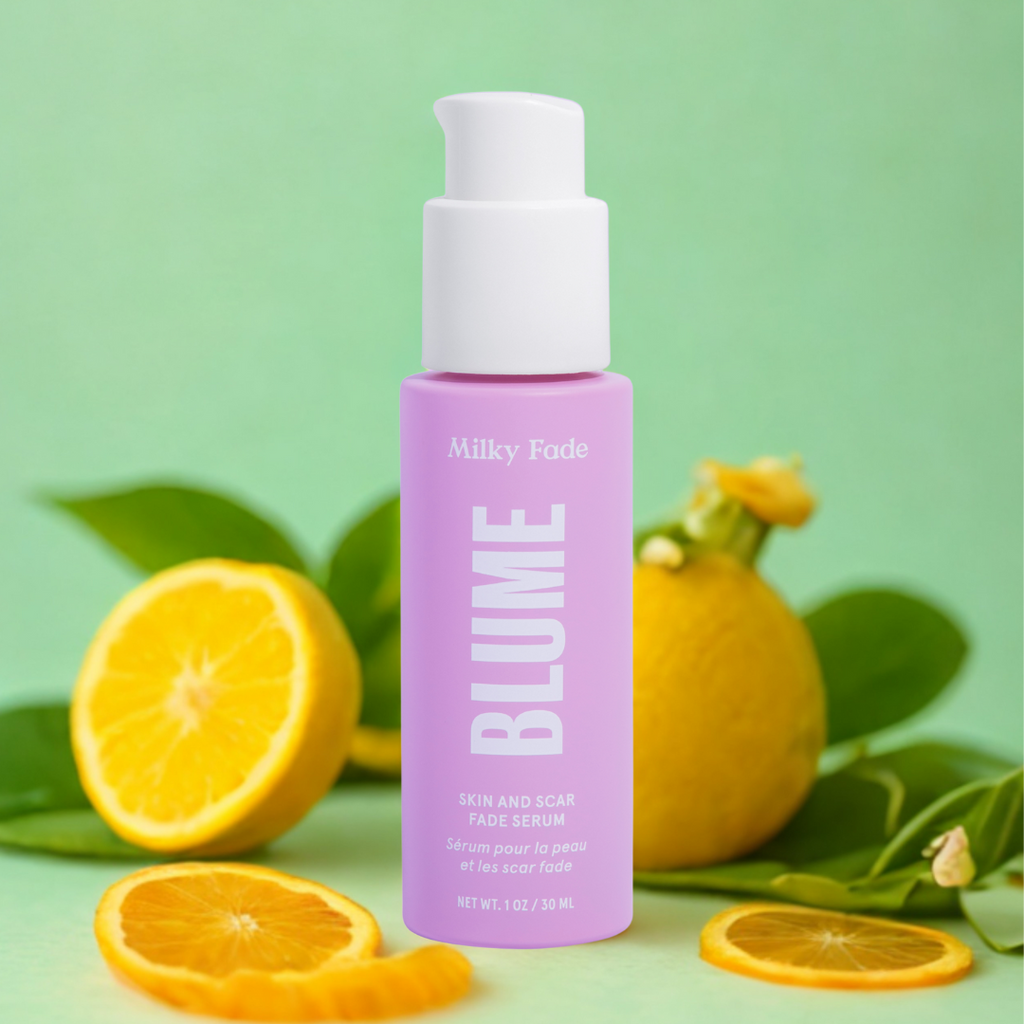When it comes to how to remove dark spots on face, Vitamin C often tops the list of recommended ingredients. Scroll through TikTok or browse any beauty aisle, and you’ll see Vitamin C serums promising brighter, more even skin. But here’s the real question: Is Vitamin C for dark spots enough on its own, or is it just one piece of the puzzle?
The truth is, while Vitamin C is a proven powerhouse for brightening and protecting skin, most dermatologists agree that fading hyperpigmentation effectively requires a multi-pronged approach. Let’s unpack the science behind dark spots, the role Vitamin C plays, and why combining it with other ingredients (like in Blume’s Milky Fade Spot & Scar Serum) can deliver the best results.
Understanding Dark Spots: What’s Really Happening in Your Skin
Dark spots, also known as hyperpigmentation, are the result of excess melanin production. Melanin is the pigment that gives your skin, hair, and eyes their color. When your skin produces too much in one area, it shows up as a darker patch.
The most common triggers include:
-
UV exposure: Sunlight is the biggest driver of hyperpigmentation, both by increasing melanin production and making existing spots darker.
-
Post-inflammatory hyperpigmentation (PIH): The lingering dark marks left after acne, eczema, or irritation.
-
Hormonal changes: Conditions like melasma are often linked to pregnancy, birth control, or hormone fluctuations.
-
Skin injury: Cuts, burns, or even aggressive exfoliation can leave behind pigment changes.
According to the American Academy of Dermatology, sunscreen is your first defense. Without daily UV protection, even the most potent brightening serum won’t be able to make lasting progress.
Vitamin C for Dark Spots: The Science
Vitamin C, scientifically known as ascorbic acid, is a water-soluble antioxidant that’s famous for its skin-brightening abilities.
How it works:
-
Inhibits Tyrosinase: This enzyme is essential for melanin production. Less tyrosinase activity means less pigment formation.
-
Neutralizes Free Radicals: Sun exposure and pollution cause oxidative stress, which can trigger pigmentation. Vitamin C stops this chain reaction.
-
Boosts Collagen Production: Brighter skin isn’t just about fading spots. Collagen improves skin texture and radiance.
Why Vitamin C Alone Might Not Be Enough
Here’s the catch: Vitamin C is effective, but hyperpigmentation is complex. It develops in layers of the skin and is influenced by multiple triggers. That’s why dermatologists often recommend combining Vitamin C with other brightening agents for better results.
Limitations of Vitamin C as a solo treatment:
-
It can’t exfoliate away pigmented cells.
-
It won’t directly address inflammation, which is often at the root of PIH.
-
It works best preventatively, but may take months to fade existing dark spots on its own.
Ingredients That Work Alongside Vitamin C
If your goal is faster, more visible results, these are the ingredients to pair with Vitamin C:

Why Combination Formulas Work Best
The most effective way to remove dark spots is by tackling the problem from multiple angles:
-
Block melanin production (Vitamin C, niacinamide, arbutin)
-
Exfoliate pigmented cells (AHAs like glycolic acid, retinoids)
-
Soothe inflammation (Centella Asiatica, aloe vera)
-
Protect against UV (mineral sunscreen)
This multi-layered strategy is exactly what makes Milky Fade’s formula so effective. It’s designed to hit every step in this process.
Milky Fade: A Case Study in Multi-Action Brightening
Blume’s Milky Fade Spot & Scar Serum is a perfect example of why Vitamin C doesn’t have to work alone.
What’s inside:
-
Vitamin C (Ascorbyl Glucoside): A stable form that brightens and protects.
-
Niacinamide: Reduces melanin transfer and supports skin barrier.
-
Centella Asiatica: Soothes irritation and inflammation, key for preventing PIH.
-
Bilberry Extract: Antioxidant-rich plant extract that helps defend against environmental stressors.
-
Hyaluronic Acid: Keeps skin hydrated and plump, preventing dryness that can worsen pigmentation.

Why it works:
By combining brightening, protective, and soothing benefits, Milky Fade tackles dark spots from both the cause and the symptom side, slowing melanin production, fading what’s already there, and keeping your skin barrier strong so it’s less likely to develop future spots. Because it avoids harsh percentages of Vitamin C or overly aggressive exfoliants, it’s gentle enough for sensitive and melanin-rich skin.
How Long Does It Take to See Results?
Patience is key. For most people, 4-12 weeks of consistent use is needed to see noticeable fading, especially for deep-set pigmentation. Fresh post-acne marks may fade faster, while long-standing sunspots can take longer.
The Role of Sunscreen in Preventing Dark Spots
Even the best serum won’t work if you’re skipping sunscreen. UV rays not only create new pigmentation but also darken existing spots. Pair your treatment with a mineral sunscreen for best results!
The Bottom Line: Is Vitamin C Enough?
Vitamin C for dark spots is powerful, but it’s most effective when combined with other brightening, soothing, and protective ingredients.
If you want to know how to remove dark spots on face effectively, think of Vitamin C as the star of the show but with an ensemble cast that makes the performance truly memorable.
Milky Fade’s formulation proves that a multi-action approach can deliver brighter, smoother, more even-toned skin without irritation.



